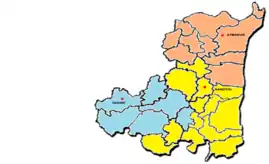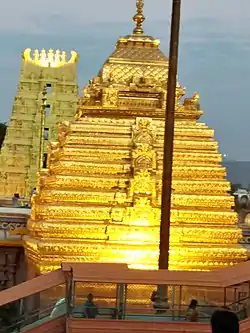Nandyal district | |
|---|---|
    .jpg.webp) Clockwise from top-left: Lower temple, Ahobilam, Belum Caves, Yaganti Umamaheshwara Temple, Shivanandishwara Temple in Kadamala Kalva, Srisailam Reservoir | |
.svg.png.webp) Location of Nandyal district in Andhra Pradesh | |
| Coordinates: 15°30′N 78°30′E / 15.5°N 78.5°E | |
| Country | |
| State | |
| Region | Rayalaseema |
| Formed | 4 April 2022 |
| Founded by | Government of Andhra Pradesh |
| Headquarters | Nandyal |
| Administrative Divisions | |
| Government | |
| • District collector | Manazir Jeelani Samoon, Collector and District magistrate |
| Area | |
| • Total | 9,681 km2 (3,738 sq mi) |
| Population (2011)[1] | |
| • Total | 1,781,777 |
| • Density | 180/km2 (480/sq mi) |
| Time zone | UTC+05:30 (IST) |
| Website | nandyal |
Nandyal district is a district in the Indian state of Andhra Pradesh with Nandyal as its administrative headquarters, it was formed on 4 April 2022 to become one of the resultant 26 districts. It is part of the Rayalaseema region. The district consists of Nandyal revenue division and a newly formed Dhone revenue division and Atmakur revenue division from Kurnool district.
Etymology
The district derived its name from its headquarters Nandyal.
History
Belum Caves are geologically and historically important caves in the district. There are indications that Jain and Buddhist monks were occupying these caves centuries ago. Many Buddhists relics were found inside the caves. These relics are now housed in Museum at Anantapur. Archaeological survey of India (ASI) found remnants of vessels and other artifacts of pre-Buddhist era and has dated the remnants of vessels found in the caves to 4500 BC.[2]
Geography
This district is bounded on the north by Krishna rivers as well as Mahabubnagar district of Telangana State, on the south by Kadapa district and Anantapur Districts on the west by the Kurnool district and on the east by Prakasam District.[1]
Nallamala and Erramala are the two major mountain ranges which run in parallel from north to south of the district running in parallel from north to south. The Erramalas divide the district into two parts.The eastern part of the district lies between Erramalas and Nallamalas. It has mainly black cotton soil. Krishna and Kunderu are the main rivers. Kunderu also known as Kumudvathi originates on the western side of Erramala hills. It flows towards south through Midthur, Gadivemula, Nandyal,Gospadu, Koilakuntla, Dornipadu and Chagalamarri mandals before entering YSR District.[1]
Forest of the district covers an area of 3,08,607 hectares. It is about 32% of the district. It is confined to hilly areas of Nallamala and Erramala and part of Velikonda hills. Tamarind and Beedi leaves are forest's minor produce. Tigers and panthers are the main wild animals. Partridges, peacocks, red jungle foul are some of the birds in the forest. Nagarjuna Sagar – Srisailam wildlife Sanctuary with an area of 46.815 hectares is created in the north of Nallamalas to protect wildlife. Project Tiger was started near Srisailam with an area of 3,568 sq.km. As per 2003 census, there were 64 Tigers and 78 Panthers.[1]
Rollapadu village of Midthur mandal is famous for the spotting of the great Indian Bustard (Batta Meka) an endangered bird. A bird sanctuary with an area of 1,600 hectares was established to protect this species.[1]
Demographics
Based on the 2011 census Nandyal district had a population of 1,781,777, of which 385,185 (21.62%) live in urban areas. Nandyal district has a sex ratio of 985 females per 1000 males. Scheduled Castes and Scheduled Tribes make up 322,825 (18.12%) and 52,784 (2.96%) of the population respectively.[4]: 77–81
Based on the 2011 census, 81.08% of the population spoke Telugu and 17.25% Urdu as their first language.[5]
Administrative divisions

The district has three revenue divisions, namely Atmakur, Nandyal and Dhone, each headed by a sub collector. These revenue divisions are divided into 29 mandals.[6][7][8][9][10]
Mandals
There are 10 mandals in Atmakur division, 6 mandals in Dhone division and 14 mandals in Nandyal. 30 mandals under their revenue divisions are listed below:
- Atmakur revenue division
- Atmakur
- Bandi Atmakur
- Jupadu Bunglow
- Kothapalle
- Miduthuru
- Nandikotkur
- Pagidyala
- Pamulapadu
- Srisailam
- Velugodu
- Dhone revenue division
- Banaganapalli
- Bethamcherla
- Dhone
- Koilkuntla
- Owk
- Peapully
- Nandyal revenue division
- Allagadda
- Chagalamarri
- Dornipadu
- Gadivemula
- Gospadu
- Kolimigundla
- Mahanandi
- Nandyal Rural
- Nandyal Urban
- Panyam
- Rudravaram
- Sanjamala
- Sirivella
- Uyyalawada
Cities and towns
The district has of 6 municipalities namely Nandyal, Dhone, Atmakur, Allagadda, Bethamcherla and Nandikotkur.[6]
| City / Town | Civic status of city/town | Revenue Division | 2011 Census
population |
|---|---|---|---|
| Nandyal | Special Grade Municipality | Nandyal | 211,424 |
| Dhone | Grade - 2 Municipality | Dhone | 59,272 |
| Nandikotkur | Grade - 2 Municipality | Atmakur | 46,593 |
| Atmakur | Grade - 3 Municipality | Atmakur | 45,703 |
| Allagadda | Grade - 2 Municipality | Nandyal | 42,545 |
| Bethamcherla | Nagar Panchayat | Dhone | 38,994 |
Politics
There are one parliamentary and six assembly constituencies in Nandyal district. The parliamentary constituencies are Nandyal The assembly constituencies are given below.[11]
| Constituency number | Name | Reserved for (SC/ST/None) |
Parliament |
|---|---|---|---|
| 134 | Allagadda | None | Nandyal |
| 135 | Srisailam | None | |
| 136 | Nandikotkur | SC | |
| 139 | Nandyal | None | |
| 140 | Banaganapalle | None | |
| 141 | Dhone | None | |
| 138 | Panyam (partially) | None |
Tourism


Srisailam is the abode of Brahmaramba Mallikarjuna Swamy. The deity is in natural stone formation in the shape of lingam. It is one of the twelve Jyotirlingams in the country. The temple was built in 14th century. Mahanandiswara temple dates back to the 7th century. Nearby pushkarani has crystal clear water. The temple of Navanarasimha (Nine Forms of Lord Narasimha) is in upper Ahobilam. The temple of Prahladavarada is in lower Ahobilam. Yaganti is the home of Uma Maheswara Swamy. There is a huge Nandi statue with size of 15’ X 10’ X 8’. Belum caves discovered in 1982 are the second largest natural caves in India after Meghalaya caves. These caves have 3 well like cavities. These are longer than Borra Caves in Vizag district. These have long passages, spacious chambers and fresh water siphons. Rollapadu Wildlife Sanctuary is of interest for bird watchers.[12][13] [14]
Notable people
Pendekanti Venkatasubbaiah, who served as central minister and governor was born at Sanjamala.
References
- 1 2 3 4 5 6 CPO 2022, p. 1.
- ↑ Show Caves of India: Belum Caves
- ↑ "Population by Religion - Andhra Pradesh". censusindia.gov.in. Registrar General and Census Commissioner of India. 2011.
- ↑ "District Census Hand Book – Kurnool" (PDF). Census of India. Registrar General and Census Commissioner of India.
- 1 2 "Table C-16 Population by Mother Tongue: Andhra Pradesh". Census of India. Registrar General and Census Commissioner of India.
- 1 2 CPO 2022, p. XVII.
- ↑ Raghavendra, V. (26 January 2022). "With creation of 13 new districts, AP now has 26 districts". The Hindu. ISSN 0971-751X. Archived from the original on 26 January 2022. Retrieved 26 January 2022.
- ↑ "AP issues draft gazette notification on 26 districts". Deccan Chronicle. 26 January 2022. Archived from the original on 29 January 2022. Retrieved 11 February 2022.
- ↑ "New districts to come into force on April 4". The Hindu. 30 March 2022. Retrieved 31 March 2022.
- ↑ "కొత్త జిల్లా తాజా స్వరూపం". Eenadu.net (in Telugu). 31 March 2022. Retrieved 31 March 2022.
- ↑ "District-wise Assembly-Constituencies". ceoandhra.nic.in.
- ↑ CPO 2022, p. III-VIII.
- ↑ AP Tourism E-Brochure Nandyal district (PDF). 2023. Retrieved 28 June 2023.
- ↑ "Places of interest - Nandyal district". Nandyal district. Retrieved 18 April 2023.
Books
CPO (2022). District Hand Book of Statistics – 2020, Nandyal district (Compiled as per the new district boundary) (PDF).